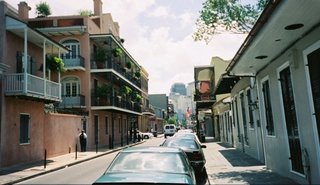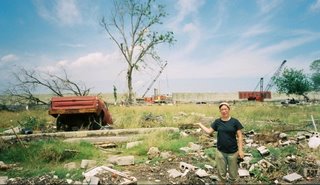
I believe my memories will seem more appropriate as they accumulate the dreamy gauze of passing time. Maybe they will become as my first memories of New Orleans, when I was seven years old: vague images of walking around in trashbag ponchos, making sure Mema Caver was satisfied by stopping for beignet. This trip by contrast, seems too crisp, too real; yet the images I retain seem equally incredible. Here are a few of those.
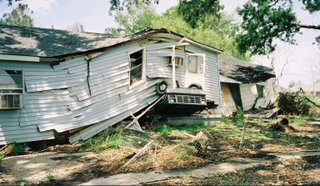
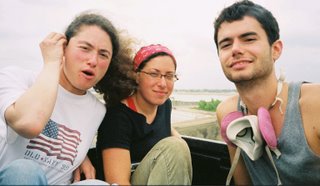
Taking a break in the Lower 9th Ward, I decide to go for a walk with Kavanah to survey some of the streets and eat one of the ubiquitous Detour® protein bars that seemed to keep coming in to Common Ground on a daily basis. The remnants of the destruction was brutal and grotesque, as if gravity had forgotten to function for a time and suddenly remembered its duties in one devastating coup. In the distance we could see the broken levee, still being repaired. A few people were driving around, most not even getting out of their cars, snapping photos from the window. At Blue House, one woman mouthed “Thank you” to me as I carried out a wheelbarrow of cardboard. She and I both were participating in our own versions of disaster tourism...
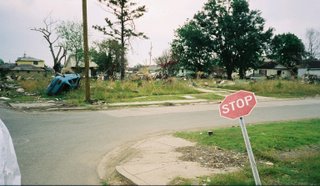
Six, seven, now eight of us hard at work stripping down a house, attacking it like some massive carcass – this is why they call it “gutting.” In our arsenal are sledgehammers, crowbars, prybars, and steel toed boots. Suddenly over the din of the splintering of boards and pounding of drywall we hear a repetitive melody growing in the distance. We stop work and go outside where an unflappable ice cream truck is plodding down the street. But ice cream man, there aren’t any children at this home or the next one, or the next one. They left their books and toys on the porch and now we are tearing there houses apart, leaving only a skeleton of wooden beams. Judging by the foundation on this one, the whole thing may have to go...
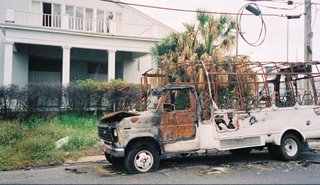
I’m doing yoga at sunset on the third floor of a Catholic school that now houses volunteers. The group is asked to focus on our third eye as we sit in pose and envision ourselves floating up above New Orleans, then higher until we are looking down on planet Earth, then even further out to the ethers of the universe. These classrooms were where many surviving residents clung to for life when the flood waters rushed higher. At night gunfire can be heard in the distance...
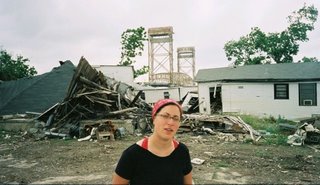
After tearing a part of roofing down off the deck of his house and helping him paint inside, an extremely hospitable resident takes us around the corner for Chinese food and beer. We eat it back at his place and listen to stories of how he used to deal drugs and went to jail for 8 years. How he came to New Orleans to get a fresh start and after volunteering for a while, found a job cooking and catering. He’s optimistic to see his children in the coming months for the first time in years...
We’re moving soggy boxes of rations off a U-Haul truck on to pallets which we will then tarp. We’re moving other food boxes, speckled with black mold, out of the kitchen area and then tarping them, too. All of a sudden two low-flying army helicopters swoop down, arching over the city. Somebody says it’s forward security for President Bush. As we are finishing tarping one of the residents stops by and says that Bush was there, two blocks away. “The Secret Service stopped me and told me to turn around or they would escort me away,” he said. In the paper the next day there was Bush, holding hands with a 9th Ward resident and frowning. Bruce Springstein also paid a visit while he was in town for Jazzfest, stopping by the Blue House and signing autographs. I was at another site, but apparently he was very personable...
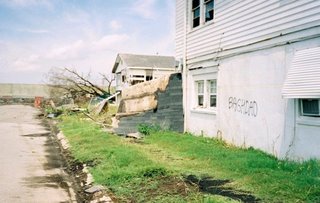
I’m shooting basketball with a survivor and another volunteer in the school gym. The hardwood court is long gone, instead there is a plastic tarp covering concrete. The goal is right in front of a stage that has a huge plastic tarp covering the entire opening. There is a sign that reads something like – “There is asbestos on this stage, do not play basketball.” We pretend not to notice it. Instead we listen to the middle-aged man tell stories of how 20 years ago young men from all around the neighborhood would come and play pick-up games in this gym. As he relished those memories of neighborhood glory, I wondered just how much I would savor my own memories sharing the court...
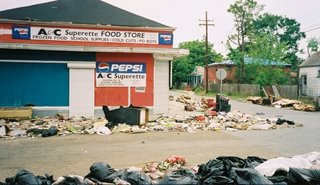
Common Ground’s motto is “solidarity not charity.” Survivor’s volunteer a portion of their time to rebuilding and are provided room and board and time to look for work and reassemble their lives. Volunteers coming in from outside New Orleans are expected to rise at 6:30 am daily and put in at least 6-8 hours of work based on their capabilities in exchange for three home-cooked meals, somewhat reliable running water, and a place to lie down at the end of the day. They also receive orientation and reading materials on racism and the history of the 9th ward. Common Ground is thus a kind of laboratory for rebuilding community whereby everyone is learning experientially what social justice means.
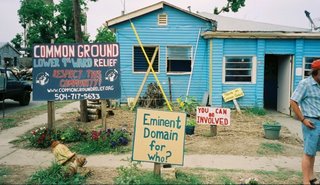
As in all laboratories, experiments are done through trial and error. As we left Common Ground, there was a transition underway. Tent city was coming down. New security measures were being instituted – including a meeting with a leader of a local gang to secure Common Ground as “neutral ground” as members moved back into the area. A new summer schedule was being phased in. Preparations were being made for a large influx of summer volunteers. People who thought of Common Ground as an “activist’s resort” were going to be asked to leave.

I wish I could have stayed longer in New Orleans. I felt like the city held a certain redemptive power over me. In all of the stifling wreckage, I felt really free, and I felt like I was doing something real. We knew that by coming down for a week, we weren’t contributing nearly as much as we received. I went anyway though, and the privilege was all mine.
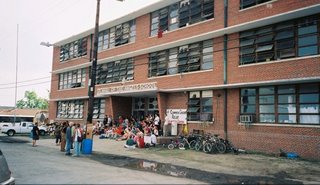
As we left New Orleans the most amazing song came on the stereo. It was on a jazz cd made special by Kavannah for the trip. Kermit Ruffins doing a remake of an old Louis Armstrong standard…
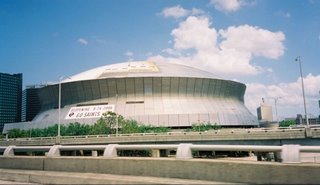
By and by, when the morning comes,
All the saints of God are gathering home.
We will tell the story how we've overcome
We will understand it better by and by.
We are often destitute of the things that life demands,
Want of shelter and of food, thirsty hill and barren land;
But we're trusting in the Lord, and according to His word,
We will understand it better by and by.
By and by, when the morning comes,
All the saints of God are gathering home.
We will tell the story how we’ve overcome
We will understand it better by and by.
